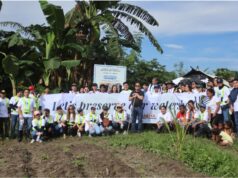CLARK FREEPORT – The president of the International Air Transport Asso-ciation (IATA) came under fire from local leaders for allegedly under-mining the potential of the Clark International Airport (CIA), formerly the Diosdado Macapagal International Airport (DMIA), here as the country’s main gateway.
Alexander Cauguiran, former CIAC executive vice president and now president of the local political party ABE Kapampangan, said that IATA president Tony Tyler Tyler’s statements “contradict the educated findings of a list of formal studies that have identified DMIA as the most ‘viable and practical’ option for a new major airport hub in the country.”
Tyler was reported as saying that the CIA is not the solution to the Philippine’s airport congestion problems.
Cauguiran expressed doubts on Tyler”s impartiality, as he cited “aviation industry experts citing Tyler’s lack of expertise to speak on airport development as he is primarily a representative of profit-oriented commercial airlines.”
“Just another one of a long line of lackeys of some vested interest groups opposed to the full development of DMIA as our country’s future premier gateway, “ Cauguiran said of Tyler.
“This much is evident in his statement that the Philippines has a rich aviation history because the Philippine Airlines is a pioneering airline in the region. Mr. Tyler further betrayed his protectionist stance in favor of PAL when he inappropriately urged Pres. Aquino to make a hub airport for Manila a priority,” Cauguiran noted.
He said that various studies contradict Tyler’s statement that “building a secondary airport or increasingly splitting the traffic with Clark in its current form will not be sufficient to put the Philippines on the same playing field as its much more competitive neighbours.”
Cauguiran, who was among the local leaders who batted for the development of the CIA as a premiere gateway of the country way back in the 1990’s, noted “formal studies that have identified DMIA as the most viable and practical option for a new major airport hub in the country.”
He cited the “the Master Plan and Preliminary Phase 1 Feasibility Study for DMIA (2005) by Pacific Consultants International, the Feasibility Study for the Master Development Plan for DMIA (2008) by Korea International Cooperation Agency or KOICA, the Clark International Airport Land Use Plan Study (2010) by AECOM and The Asia Foundation funded by the United States Agency for International Development (USAID), and the Gateway Airports Development Strategy for the National Capital Region (2011) funded by the Japan International Cooperation Agency (JICA).”
“The JICA funded study specifically looked into six possible locations for a new international gateway to replace NAIA,” he said.
Cauguiran quoted the JICA study as concluding that “of the above six options only DMIA proved to be developable in a relatively short period of time because of its readily available significant land area.
Other sites would require long lead times before land could be reformed for development because of various reasons including negotiations over compensation, land reform, etc.”
He said the JICA study also concluded that “in order to ensure that the future DMIA compares well with other Asian gateway airports there is a need to significantly improve accessibility between DMIA and Metro Manila.
The disadvantage of its remoteness could be overcome by offering a short travel time between Metro Manila and DMIA through the provision of a modern Airport Express Rail Link.”
“We believe, just like the findings of JICA, that given the right political wing and unity of purpose of our entire national and local government bureaucracy, the full development of DMIA including the necessary accessibility infrastructure can be completed within a period of seven years,” Cauguiran noted.
“Tyler, who is a foreigner, has no right to dictate upon our Pres. Aquino on what should be our country’s best airport development policy and strategy—a critical issue that has tremendous impact on our overall social and economic development,” he added.
Cauguiran said that “consistent with one of the four basic principles of Partido Abe Kapampangan— the pillar of Parity and Equitability in Development— we believe that the full development of DMIA shall finally spell economic growth and progress outside of Metro Manila including Pampanga, the rest of Central Luzon and Northern Luzon.”
“We are advocating immediate government actions that will set into motion the development of needed infrastructure and facilities that will complete and realize the full potentials of DMIA,” Cauguiran also said.




